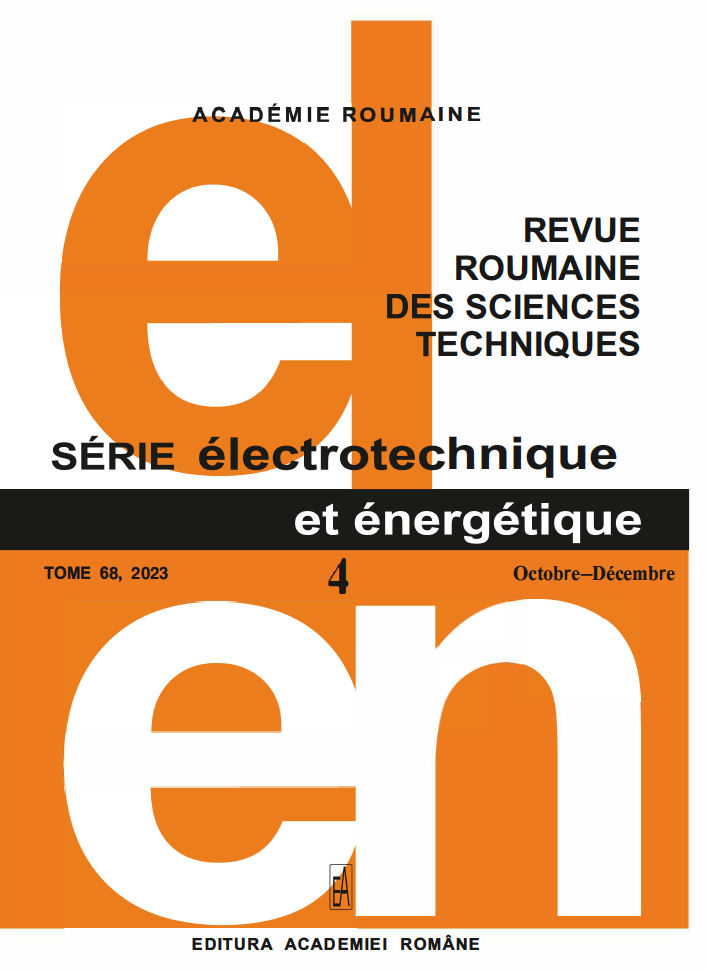CONTRÔLEUR PID FUZZY À ORDRE FRACTIONNEL BASÉ SUR RED FOX POUR CIRCUIT DE PILOTAGE DE LED INTELLIGENT
DOI :
https://doi.org/10.59277/RRST-EE.2023.4.12Mots-clés :
Diodes électroluminescentes haute puissance, Convertisseur élévateur sans transformateur, Contrôleur PID d'ordre fractionnaire, Contrôleur flou, Algorithme d'optimisation du renard rouxRésumé
Récemment, l'éclairage traditionnel a été remplacé par des LED haute puissance (HPLED) en raison de ses développements importants, de sa durée de vie prolongée, de sa luminosité élevée, de sa fiabilité élevée et de son efficacité énergétique élevée. Même si les convertisseurs conventionnels peuvent adapter avec précision le courant de chaque LED, ils présentent certaines limites lorsqu'ils pilotent une longue chaîne de LED. Pour résoudre ce problème, cet article présente un nouveau convertisseur élévateur CC-CC (ITDC) sans transformateur amélioré à gain élevé basé sur un contrôleur PID flou à ordre fractionnaire optimisé pour le renard rouge (RF-FOFPID) pour un circuit pilote de LED intelligent avec une capacité de régulation de tension optimale. Le biais d'erreur est augmenté jusqu'à zéro en appliquant FOPID aux étapes de compensation basées sur la logique floue. L'algorithme d'optimisation Red Fox est utilisé pour ajuster les paramètres de contrôle du contrôleur PID flou à niveau fractionnaire avec une plus grande précision afin de résoudre des problèmes limités avec divers espaces de recherche. Le modèle Simulink du convertisseur proposé a été créé à l'aide de l'outil logiciel MATLAB Simulink et comparé à des contrôleurs utilisant un PID d'ordre fractionnaire, un PID flou et une dérivée proportionnelle intégrale (PID) conventionnelle. Les résultats ont démontré qu'en termes de dépassement minimum, de temps de stabilisation, de temps de montée et d'erreur en régime permanent, le convertisseur proposé basé sur RF-FOFPID surpasse les convertisseurs de courant en matière de régulation de tension.
Références
(1) M. Zhao, Q. Zhang, Z. Xia, Narrow-band emitters in LED backlights for liquid-crystal displays, Materials Today, 40, pp. 246–265 (2020).
(2) Y. Huang, E.L. Hsiang, M. Y. Deng, S. T. Wu, Mini-LED, micro-LED and OLED displays: present status and future perspectives, Light: Science & Applications, 9, 1, pp. 1–16 (2020).
(3) A. Tepljakov, B.B. Alagoz, C. Yeroglu, E. Gonzalez, S.H. Hossein Nia, E. Petlenkov, FOPID controllers and their industrial applications: A survey of recent results, IFAC-PapersOnLine, 51, 4, pp. 25–30 (2018).
(4) Y. Arya, A novel CFFOPI-FOPID controller for AGC performance enhancement of single and multi-area electric power systems, ISA transactions, 100, pp. 126–135 (2020).
(5) A. Mohanty, M. Viswavandya, S. Mohanty, An optimised FOPID controller for dynamic voltage stability and reactive power management in a stand-alone micro grid, International Journal of Electrical Power & Energy Systems, 78, pp. 524–536 (2016).
(6) M.A. George, D.V. Kamat, C.P. Kurian, Electronically tunable ACO based fuzzy FOPID controller for effective speed control of electric vehicle, IEEE Access, 9, pp. 73392–73412 (2021).
(7) C. Zhou, Q. Zhang, D. Ezechias, Y. Gao, H. Deng, S. Qu, A general digital PID controller based on PWM for buck converter, in Proceeding of the 11th World Congress on Intelligent Control and Automation, IEEE, pp. 4596–4599 (2014).
(8) W. Widonarko, G.A. Rahardi, C. Avian, W. Hadi, D. W. Herdianto, P.L. Satrio, Driver for led lamp with buck converter controlled by PID, International Seminar on Intelligent Technology and Its Applications (ISITIA).
(9) C.C. Raicu, G.C. Seritan, B.A. Enache, 48 V network adoption for automotive lighting systems Rev. Roum. Sci. Techn. – Électrotechn. Et Énerg., 66, 4, pp. 231–236 (2021).
(10) S.V. Adhul, T. Ananthan, FOPID controller for buck converter, Procedia Computer Science, 171, pp.576-582 (2020).
(11) A. Chakrabarti, P.K. Sadhu, P. Pal, A novel dead-time elimination strategy for voltage source inverters in induction heating systems through fractional order controllers, Rev. Roum. Sci. Techn. – Électrotechn. Et Énerg., 67, 2, pp. 181–185 (2022).
(12) C. Demircan, O.V. Güler, A. Keçebaş, Meta-heuristic algorithm-based optimal PID controller design for power converters, Advances in Artificial Intelligence Research, 1, 2, pp. 67–72 (2021).
(13) M.E. Çimen, Z.B. Garip, A.F. Boz, Chaotic flower pollination algorithm based optimal PID controller design for a buck converter, Analog Integrated Circuits and Signal Processing, 107, 2, pp. 281–298 (2021).
(14) S.M. Ghamari, H.G. Narm, H. Mollaee, Fractional‐order fuzzy PID controller design on buck converter with antlion optimization algorithm, IET Control Theory & Applications, 16, 3, pp. 340–352 (2022).
(15) P. Warrier, P. Shah, Optimal fractional PID controller for buck converter using cohort intelligent algorithm, Applied System Innovation, 4, 3, p. 50 (2021).
(16) L.C. Borin, E. Mattos, C.R. Osorio, G.G. Koch, V.F. Montagner, Robust PID controllers optimized by PSO algorithm for power converters, in IEEE 15th Brazilian Power Electronics Conference and 5th IEEE Southern Power Electronics Conference (COBEP/SPEC), pp. 1–6 (2019).
(17) A.M.S.S. Andrade, T.M.K. Faistel, R.A. Guisso, A. Toebe, Hybrid high voltage gain transformerless dc–dc converter, IEEE Transactions on Industrial Electronics, 69, 3, pp. 2470–2479 (2021).
(18) L.S. Yang, T.J. Liang, J.F. Chen, Transformerless dc–dc converters with high step-up voltage gain, IEEE Transactions on Industrial Electronics, 56, 8, pp. 3144-3152 (2009).
(19) D. Połap, M. Woźniak, Red fox optimization algorithm, Expert Systems with Applications, 166, p. 114107 (2021).
(20) J.G. Malar, V. Thiyagarajan, N.B.M. Selvan, M.D. Raj, Electric vehicle onboard charging via Harris hawks optimization-based fractional-order sliding mode controller, Rev. Roum. Sci. Techn. – Électrotechn. Et Énerg., 68, 1, pp. 30–35 (2023).
Téléchargements
Publiée
Numéro
Rubrique
Licence
(c) Copyright REVUE ROUMAINE DES SCIENCES TECHNIQUES — SÉRIE ÉLECTROTECHNIQUE ET ÉNERGÉTIQUE 2023

Ce travail est disponible sous licence Creative Commons Attribution - Pas d'Utilisation Commerciale - Pas de Modification 4.0 International.


